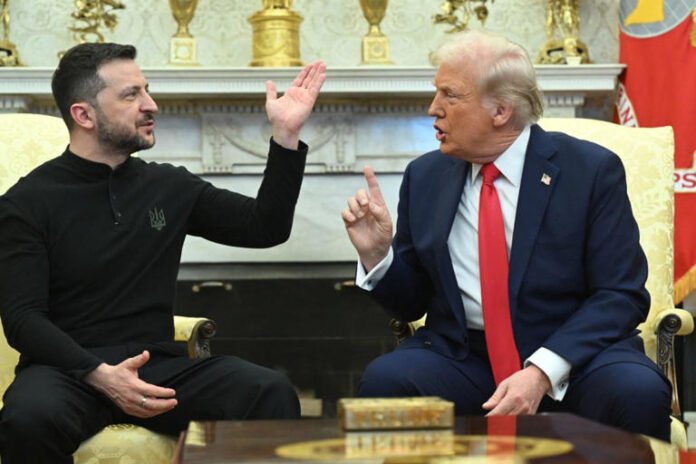In the wake of a public confrontation between U.S. President Donald Trump and Ukrainian President Volodymyr Zelenskyy, diplomatic channels are abuzz with discussions about potential peace negotiations involving Russia. The recent spat has not only strained U.S.-Ukraine relations but also influenced the broader geopolitical landscape concerning the ongoing conflict in Eastern Europe.
The Trump-Zelenskyy Oval Office Confrontation
On February 28, 2025, Presidents Trump and Zelenskyy engaged in a highly contentious meeting at the White House. The discussion, intended to solidify agreements on Ukraine’s rare earth minerals and address the ongoing war with Russia, devolved into a public dispute. Trump and Vice President J.D. Vance accused Zelenskyy of prolonging the conflict and displaying ingratitude for U.S. support. The meeting concluded abruptly without any agreements, marking a historic low in U.S.-Ukraine diplomatic relations.
Reactions and Repercussions
The fallout from the Oval Office incident was swift. The Trump administration suspended all military aid to Ukraine, a move that left Kyiv vulnerable amid ongoing hostilities with Russia. European allies expressed concern over the escalating tensions, emphasizing the necessity of U.S. support to deter further Russian aggression. Russian officials, conversely, lauded the confrontation, interpreting it as a diplomatic victory that could potentially weaken Ukraine’s defense posture.
Zelenskyy’s Response and Commitment to Peace
In the aftermath, President Zelenskyy expressed regret over the confrontation, labeling it “regrettable,” and reiterated his readiness to work under President Trump’s leadership to achieve lasting peace. He outlined a phased peace plan, proposing a truce on missile and drone strikes, the release of prisoners of war, and direct negotiations with Russia. Zelenskyy also emphasized Ukraine’s commitment to a minerals agreement with the U.S., aiming to bolster Ukraine’s security guarantees through economic collaboration.
Prospective Peace Negotiations: Locations and Dates
Amid these developments, discussions have emerged regarding potential peace negotiations involving the U.S., Ukraine, and Russia. While specific dates and locations have yet to be finalized, several venues are under consideration:
- Geneva, Switzerland: Known for its neutrality and history of hosting diplomatic talks, Geneva is a prime candidate for facilitating discussions among the involved parties.
- Helsinki, Finland: With a legacy of East-West diplomacy, Helsinki offers a strategic location for negotiations, symbolizing a bridge between differing geopolitical interests.
- Vienna, Austria: As a hub for international diplomacy, Vienna provides the infrastructure and neutrality conducive to high-stakes negotiations.
The timing of these talks is contingent upon several factors, including the stabilization of U.S.-Ukraine relations and the willingness of Russia to engage in meaningful dialogue. European allies are actively involved in shaping the framework of these negotiations, emphasizing the importance of a united front to ensure a sustainable peace agreement.
European Involvement and Strategic Interests
European leaders, notably UK Defence Secretary John Healey, have engaged in discussions with U.S. counterparts to define the parameters of a potential peace plan for Ukraine. The proposed plan includes a phased truce, cessation of sea and air attacks, and the possible deployment of European troops to enforce peace agreements. European nations underscore the necessity of U.S. military support to deter future Russian aggression, advocating for a comprehensive approach that combines diplomatic, economic, and military strategies.
Challenges Ahead
Several challenges loom over the prospective negotiations:
- Restoring U.S.-Ukraine Relations: The recent spat has strained bilateral relations, necessitating confidence-building measures to realign both nations toward common strategic goals.
- Securing Russian Engagement: Russia’s willingness to participate in negotiations in good faith remains uncertain, particularly given the recent diplomatic rifts and its strategic interests in the region.
- Ensuring European Cohesion: European allies must maintain a unified stance, balancing diverse national interests to present a consolidated approach in the negotiations.
- Addressing Security Guarantees: Establishing credible security assurances for Ukraine is pivotal to any peace agreement, requiring commitments that deter future aggression and promote regional stability.
The convergence of diplomatic efforts following the Trump-Zelenskyy spat signifies a critical juncture in addressing the protracted conflict involving Ukraine and Russia. While the path to peace is fraught with complexities, the concerted endeavors of the U.S., Ukraine, Russia, and European allies reflect a shared recognition of the imperative to resolve the conflict through diplomatic means. The forthcoming negotiations, contingent upon meticulous planning and mutual concessions, hold the potential to reshape the geopolitical landscape and usher in a new era of stability in Eastern Europe.

